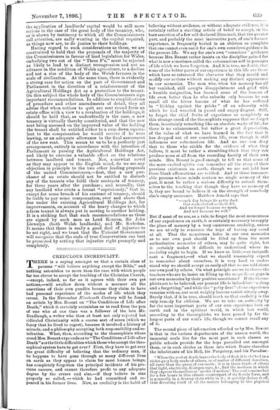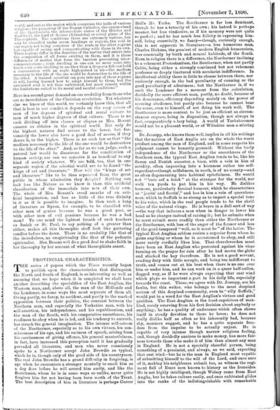CREDULOUS INCREDULITY.
THERE is a saying amongst us that a certain class of persons 'swill believe anything except the Bible," and nothing astonishes us more than the ease with which people far too clever to accept the teaching of the Christian Church, —except, indeed, so far as it agrees with their own pet notions,—will swallow down without a murmur all the assertions of their own pundits because they claim to have had personal experience of the modes of life which they reveal. In the November Nineteenth Century will be found an article by Mrs. Besant on "The Conditions of Life after Death," which it certainly astonishes us to read from the pen of one who at one time was a follower of the late Mr. Bradlaugh, a writer who then at least not only rejected but ridiculed Christianity with a coarse sort of acorn (which we fancy that he lived to regret), because it involved a history of miracle, and a philosophy accepting both responsibility and re- tribution. What, then, according to the theosophists whose creed Mrs. Besant expounds as to "The Conditions of Life after Death "are the little difficulties which those who accept the theo- sophical system have to get over? First, they have to get over the great difficulty of believing that the ordinary man, if he happens to have gone through so many different lives on earth as they appear to claim for most human beings, has completely forgotten the principal incidents of his pre- vious careers, and cannot therefore profit to any adequate degree by the errors and sins,—if they believe in sins properly so called, — which he had committed and re- pented in his former lives. Now, as credulity is the habit of believing without evidence, or without adequate evidence, it is certainly rather a startling article of belief to accept, on the bare assertion of a few self-declared illuminati, that the greater part, and probably the most instructive part, of one's former experience, is frequently buried in an oblivion so complete that one cannot even use it for one's own conscious guidance in the present life. We say for one's own " conscious " guidance because Mrs. Besant rather insists on the discipline gained for what is now sometimes called the subconscious self in passages of life which we have forgotten. And it is true, no doubt, that some of the better parts of our experience in this life are those which have so saturated the character that they mould and modify our actions without making any distinct appearance
in our memories. The man who, when his memory has all but vanished, still accepts disappointment and grief with a humble resignation, has learned some of the lessons of life even better than he who submits only because be can recall all the bitter lessons of what he has suffered in " kicking against the pricks" of an adversity with which he had wrestled in proud and angry disgust. Still, to forget the chief fruits of experience so completely as
this strange creed of the theosophists supposes that we forget them, is certainly something like an absolute waste of life, for there is no enhancement, but rather a great depreciation, of the value of what we have learned in the fact that it has dropped out of our conscious life, even though it still influences our subconscious life. And no one can deny that to those who stickle for the evidence of what they believe, it must be rather a stumbling-block that they can produce none at all from the recording faculty of their own minds. Mrs. Besant is good enough to tell us that some of the more exalted spirits can remember all the story of their previous existences on earth, though we are not told how these blank affirmations are verified. And to those innumer- able persons whose minds contain no single memory of the past, it must be rather a serious difficulty to submit them- selves to the teaching that though they have no memory of it, they are bound to believe it on the strength of somebody else's empty assurance. Matthew Arnold says that "—each day brings its petty dust Our soon-choked souls to fill, And we forget because we must, And not because we will."
But if most of us are, as a rule, to forget the most momentous of our experiences on earth, it is certainly necessary to supply the place of memory by a very omnivorous credulity, unless we are utterly to renounce the hope of having any creed at all. That the monstrous holes in our own memories as to our own past should be filled up from the more authoritative memories of others, may be quite right, but it certainly makes it difficult to understand where in- credulity ought to begin. If we know so little,—so insignifi- cant a fragment,—of what we should reasonably expect to remember about ourselves, it is very bard to under- stand why we should accept so easily all that we are told about our own past by others. On what principle are we to choose the teachers who are to insist on filling up the magnificent gaps in our own memories by their positive assertions ? if the theoso- phists are to be believed, our present life is indeed but 'asleep and a forgetting," and while the "petty dust" of our experience remains with us, our most weighty lessons vanish utterly away. Surely that, if it be true, should teach us that credulity is the only remedy for oblivion. We are to take on authority by far the most important parts of our own experience both on earth and in the spiritual world, in which last world, according to the theosophists, we have passed by far the largest parts of our soul's life, though we cannot recall any
of it.
The second piece of information afforded us by Mrs. Besant is that in the various departments of the unseen world, the immortal souls live for the most part in such classes as public schools provide for the boys parcelled out amongst them, or in such circles as those into which Dante classifies the inhabitants of his Hell, his Purgatory, and his Paradise :
"When the soul at death leaves the body of flesh it is clothed in a violet-grey body made of ethers, or of matter of different densities, all rarer than the gases of our earth ; it is in these kinds of ethers that light, electricity, Röntgen rays, Ac., find the medium in which they express themselves as 'modes of motion.' The soul remains but for a few hours in this etheric counterpart of its fleshly form, and is generally in a dreamy state while in it ; it quickly shakes it off, thus divesting itself of all the matter belonging to the physical world, and enters the region which comprises the hells of various religion., the purgatory of the Roman Catholics, the summerland rt the Spiritualists, the intermediate states of the Hindus and Buddhists, the land of desires (Kilmaloka) or astral plane of the Theosophists. The conditions there are extremely various, but may be classified under seven headings or regions, the soul in one region not being conscious of the souls in the other regions but capable of seeing and communicating with those in its own. These regions differ in the densities of the matter that enters into the composition of all forms existing in them, and it is these differences of matter that form the barriers preventing inter- communications ; souls dwelling in one can no more come into touch t% ith souls dwelling in another than a deep-sea fish can hold a conversation with an eagle high-poised in air—the medium necessary to the life of the one would be destructive to the life of the other. A trained occultist :mu pass into any of these regions at will, having learned how to adapt himself to them, but the untrained soul is not thus unfettered, but must remain within the limitations suited to its moral and mental conditions."
Here is a second great demand on our credulity from those who
are so incredulous of the Christian revelation. Yet whatever else we know of this world, we certainly know this, that all
that is best in our conditien depends on the easy access of men of low degrees of spiritual and moral culture to men of much higher degrees of that culture. There is no such dividing off into classes or cliques as Mrs. Besant assures us obtains in the spiritual world. Not only do the highest natures find access to the lower, but for- tunately the lower also have a good deal of access, if they desire it, to the higher. There is no such law as that "the medium necessary to the life of the one would be destructive to the life of the other." And, so far as we can judge, such a natural law would be disastrous for the constitution of human society, nor can we conceive it as beneficial to any kind of society whatever. We are told, too, that in one separate region of the celestial world are to be found "the kings of art and literature." How will the "kings of art and literature" like to be thus separated from the great public in whose admiration they delight ? Nothing can
look less like Nature as we know it than this artificial classification of the immortals into sets of their own. The whole of Mrs. Besant's creed smacks of an arti- ficial imagination, and has as little of the true divinity in it as it is possible to imagine. Is then such a king of literature as Byron, for example, to be classified with other men of genius because he was a great poet, or with other men of evil passions because he was a bad man? To our mind the lightest breath of such teachers as Isaiah or St. Paul, to say nothing of a greater than either, makes all this theosophic stuff look like guttering candles before the dawn. There is no credulity like that of the incredulous, no unspirituality like that of the pedantic spiritualist. Mrs. Besant will do a good deal to shake faith in her theosophy by her account of what theosophists assert.



















































 Previous page
Previous page